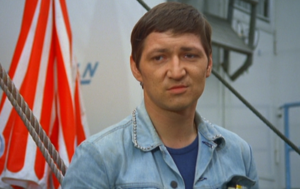STUDIO: Criterion | DIRECTOR: Rainer Werner Fassbinder | CAST: Rainer Werner Fassbinder, Peter Chatel, Karlheinz Bohm, Adrian Hoven, Harry Baer
RELEASE DATE: 1/17/17 | PRICE: DVD $29.95, Blu-ray $39.95
BONUSES: 1981 interview clip with Peer Raben, 1975 interview with Fassbinder, new interviews with Fassbinder actor/crew member Harry Baer and filmmaker Ira Sachs
SPECS: NR | 124 min. | Foreign language drama | 1.37:1 widescreen | mono | German, French and English with English subtitles
There are many landmark films by Rainer Werner Fassbinder. Fox and His Friends (1975) qualifies as one for several reasons, most prominently that it was the only time he cast himself as the sole star of one of his films.
The other reason for its importance in his filmography is that it found him depicting a gay milieu and focusing on the exploitation of a gay man by other gay men. As he had in his masterful Ali: Fear Eats the Soul (1974), he depicts in Fox the ways in which discrimination can occur in a discriminated-against segment of society.
The plot is quite simple: Blue-collar carnival worker Fox (Fassbinder) wins the lottery and finds he is now suddenly desirable among the elite. A bourgeois businessman (Peter Chatel) whose family business is failing sees Fox as ripe for the picking, and proceeds to seduce and fleece him.
The film is a stylized but still moving drama, punctuated by moments of dark humor – including an unforgettable finale, which is grim (yet oddly humorous) even by Fassbinder’s standard. As is the case with all of his best works, the film benefits by solid performances by members of his regular ensemble, with the addition of the star of Michael Powell’s Peeping Tom, Karlheinz Bohm.
Michael Ballhaus’s (The Bitter Tears of Petra von Kant) exquisite cinematography is characteristically superb, while Peer Raben’s score lends a great deal of emotion to the action, playing against Fassbinder’s ironic tone.
Two newly shot interviews and two bits of archival TV footage appear as supplements in this package. One snippet is so short – a three-minute 1981 interview with Raben – that it begs the question as to what else appeared on the French, Fassbinder-themed TV episode from which it is taken.
 In a newly shot interview, filmmaker Ira Sachs (Little Men, Keep the Lights On) discusses Fassbinder’s “fearlessness” as an artist and ways in which he was both “cruel and kind” in his depiction of the gay community in Fox. Sachs also praises Fassbinder’s famed productivity, citing as a favorite quote his motto, “We’ll fix it in the next one.”
In a newly shot interview, filmmaker Ira Sachs (Little Men, Keep the Lights On) discusses Fassbinder’s “fearlessness” as an artist and ways in which he was both “cruel and kind” in his depiction of the gay community in Fox. Sachs also praises Fassbinder’s famed productivity, citing as a favorite quote his motto, “We’ll fix it in the next one.”
A 1975 interview with Fassbinder concerning Fox finds Fassbinder spelling out what the film is about in a concise way. He declares that he wanted to show that relationships in the gay community are “actually the same as everywhere else,” and that the film is ultimately about “the impossibility of escaping the class into which you were born.”
The intriguing reason he gives for playing the lead role is that he was “interested in being identified with a minority.” Also, that “it would be easier if I used an actor who didn’t seem overtly homosexual.”
A new interview with actor and frequent assistant director for Fassbinder, Harry Baer, puts Fox in greater perspective. Baer first offers a capsule review of Fasssbinder’s social life, occasioned by the dedication at the start of the film, “For Armin and all of the others.” (Armin Meier was Fassbinder’s lover for several years; he was from the working-class, whereas RWF was from a bourgeois background.)
He then discusses the social context of the film, noting that the year before it was made (’73) “the gay paragraph” of the German criminal code was reformed, thus bringing about a new freedom. He also talks about the way in which members of the gay community were angry at the depiction of the characters in Fox.
The most valuable part of the Baer interview is when he explains the ties between Fox and Fassbinder’s favorite novel (and most significant adventure in filmmaking), Berlin Alexanderplatz. The most obvious connection is that the full name of Fassbinder’s character here is “Franz Biberkopf” (the antihero in Alexanderplatz).
In a few short minutes Baer also spells out one of the main themes of Fassbinder’s work, a task that has taken academics and film historians essays and book-length treatises to achieve. Baer’s summation of the theme? “The one who loves more than the other is the one who can be exploited.”
|
Buy or Rent Fox and His Friends
|
|||
|---|---|---|---|
 |
|||
Leave a Reply